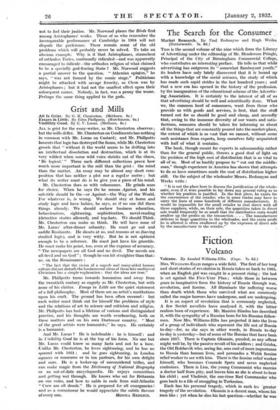The Search for the Consumer
Market Research. By Paul Redmayne and Hugh Weeks. (Butterworth. Is. tid.) Tuts is the second volume of the nine which form the Library of Advertising under the editorship of Mr. Henderson Pringle, Principal of the City of Birmingham Commercial College, Who contributes an interesting preface. He tells us that whilff advertising has outgrown its " somewhat flamboyant youth,ii its leaders have only lately discovered that it is bound up with a knowledge of the social sciences, the study of which has made such rapid strides in the last hundred years ; and that a new era has opened in the history of the profession, by the inauguration of the educational scheme of the Advertis- ing Association. It is certainly to the interest of all of us that advertising should be well and scientifically done. What we, the common herd of consumers, want from those who provide us with goods and services, is first, that the stuff turned out for us should be good and cheap, and secondly that, owing to the immense diversity of our wants and satis- factions, measures should be taken for informing us about all the things that are constantly poured into the market-place, the extent of which is so vast that we cannot, without some such assistance from experts, keep ourselves fully acquainted with half of what it contains.
The book, though meant for experts in salesmanship rather than for the general public, throws a good deal of light on the problem of the high cost of distributioa that is so vital to all of us. Most of us hastily propose to " cut out the middle- man," though experience in America has shown that attempts to do so have sometimes made the cost of distribution higher still. On the subject of the wholesaler Messrs. Itedmayne and Weeks write :
" It is not the place here to discuss the justification of the whole. saler, even if it were possible to lay down any general ruling as to whether his position is justified. In the first place, he exists for the convenience of the retailer, who in some trades may have to carry the lines of some hundreds of different manufacturers. It would be impossible for the small retailer to deal direct with all these suppliers, while, on their side, the quantities taken in direct sale would frequently be so small that the distributive costs would swallow up the profits on the transaction.. . . The manufacturer delivers in large quantities to the wholesaler, and the extra profit
he is allowed is often swallowed up by the expenses of direct sale by the manufacturer to the retailer."






































 Previous page
Previous page